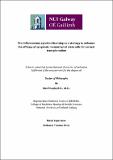| dc.contributor.advisor | Ritter, Thomas | |
| dc.contributor.author | Murphy, Nick | |
| dc.date.accessioned | 2018-05-14T08:14:46Z | |
| dc.date.issued | 2018-05-11 | |
| dc.identifier.uri | http://hdl.handle.net/10379/7350 | |
| dc.description.abstract | It has previously been demonstrated by our lab that allogeneic MSCs prolong corneal allograft survival however syngeneic MSCs fail to do so. The aim of this study was to investigate if pre-treating syngeneic MSCs with pro-inflammatory cytokines (licensing) can enhance their immunomodulatory properties and enable them to prolong corneal allograft survival.
The first part of this work focused on the optimization of an in vitro licensing strategy to most potently enhance syngeneic MSCs immunomodulatory properties. It was determined that licensing MSCs with a combination of TNF-α and IL-1β (MSCTNF-α/IL-1β) was optimum to stimulate their immunomodulatory properties. MSCTNF-α/IL-1β potently suppressed CD4+ and CD8+ T cell proliferation in addition to significantly inhibiting the MHC II expression of CD11b/c+ antigen presenting cells. The immunomodulatory capacity was primarily mediated by NO and also included significant up-regulation of other immune modulatory molecules (IL-10, PD-L1 and IL-6). Further characterisation of TNF-α/IL-1β licensed MSCs demonstrated an increase in surface expression of migration and adhesion associated molecules (ICAM-1, VCAM-1, CD47, CD44 and CD73) and their enhanced migratory potential was confirmed by transwell experiments. Moreover, microarray data indicated an increase in chemokine expression on licensed MSCs identifying an enhanced ability to recruit immune cell populations to their microenvironment.
The second part of this work investigated the ability of in vitro licensed syngeneic MSCs to prolong corneal allograft survival. Alterations to the timing strategy demonstrated untreated syngeneic MSCs could increase the allograft survival rate to 50%, an effect that was further enhanced to 70% by TNF-α/IL-1β licensing of the MSCs. Prolongation of graft survival was associated with an initial increase in B220+ regulatory macrophages and Foxp3+ regulatory T cells in the lung and spleen post-administration (day 9), culminating in an increased proportion of Foxp3+ regulatory T cells in the spleen, lung and crucially in the draining lymph node at the average time point of rejection (day 17-19). Finally, we confirmed that NO plays a critical role in mediating licensed MSCs ability to prolong allograft survival as TNF-α/IL-1β licensed MSCs transduced with Nos2-shRNA lentiviral particles lost the ability to significantly prolong allograft survival.
In summary, this work demonstrates that TNF-α/IL-1β potently enhances the immunomodulatory properties of syngeneic MSCs both in vitro and in vivo, mediated primarily by the production of NO. In vivo, MSCTNF-α/IL-1β therapy was associated with increased proportions of regulatory cells which resulted in a significant prolongation of corneal allograft survival. Therefore, this project identifies pro-inflammatory cytokine licensing as a strategy to enhance syngeneic MSC therapy for the promotion of allogeneic tissue transplant survival. | en_IE |
| dc.publisher | NUI Galway | |
| dc.rights | Attribution-NonCommercial-NoDerivs 3.0 Ireland | |
| dc.rights.uri | https://creativecommons.org/licenses/by-nc-nd/3.0/ie/ | |
| dc.subject | Immunomodulation | en_IE |
| dc.subject | Corneal Allograft | en_IE |
| dc.subject | Mesenchymal Stem Cells | en_IE |
| dc.subject | Transplantation | en_IE |
| dc.subject | Medicine | en_IE |
| dc.subject | Regenerative medicine | en_IE |
| dc.title | Pro-inflammatory cytokine licensing as a strategy to enhance the efficacy of syngeneic mesenchymal stem cells for corneal transplantation | en_IE |
| dc.type | Thesis | en |
| dc.contributor.funder | Science Foundation Ireland | en_IE |
| dc.local.note | Cornea transplantation is the most common form of tissue transplantation with 100,000 procedures carried out worldwide each year however immunological rejection of the graft remains the most common cause of graft failure. Mesenchymal stem cells (MSCs) are adult stem cells derived from the bone marrow which can suppress the host immune system. This thesis investigated the use of recipient derived (syngeneic) MSCs as a therapy to prolong corneal allograft survival. The results demonstrated that by optimising the timing of MSC administration and also enhancing the suppressive effect of the MSCs through treatment with pro-inflammatory cytokines recipient derived MSCs could prolong corneal allograft survival. | en_IE |
| dc.description.embargo | 2019-04-30 | |
| dc.local.final | Yes | en_IE |
| dcterms.project | info:eu-repo/grantAgreement/SFI/SFI Investigator Programme/12/IA/1624/IE/Novel therapeutic approaches to improve corneal allograft survival by cell and gene therapy and insights into the mechanism of action/ | en_IE |
| nui.item.downloads | 373 | |


